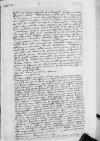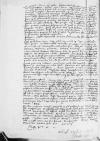Letter #1015
Cornelis DE SCHEPPER to Ioannes DANTISCUSVienna, 1533-10-08
English register:
Shortly after his return to Vienna, De Schepper sends to Dantiscus an account of his embassy to Constantinople.
He is pleased with the letter from Dantiscus which the Archbishop of Lund [Johan Weze] handed to him. Although he is satisfied with what he currently has, he wishes that his princes would show more appreciation for him. He has always tried to achieve results not by flattery or intrigue, but through loyal dedication and zeal, and to bear fortune and misfortune with equanimity. He longs to meet Dantiscus but his duty forces him to travel to Spain, with only a stopover of three days at home in Flanders. Indeed, his current mission is of crucial international importance.
There follows a brief account of the facts.
After the retreat of the Sultan [Suleiman the Magnificent] from Hungary last year, the King of the Romans [Ferdinand I] sent Hieronymus of Zadar as an envoy to the Sultan. The envoy reported that the Sultan was willing to negotiate a peace treaty with King Ferdinand, and intended to involve the Emperor [Charles V] in it. Subsequently the Sultan sent an envoy to King Ferdinand to verify the statements of the King's envoy. At that time De Schepper and Weze were staying in Vienna as ambassadors of the Emperor. De Schepper was commissioned to travel to Constantinople as an ambassador on behalf of King Ferdinand. There he was confronted with a troubled situation, caused by the rebellion of wicked Christians. Meanwhile the envoys had frequent conversations with Ibrahim Pasha and Alvise Gritti, who hold all the power.
On July 23, the peace treaty was signed in the presence of the Sultan and three of the pashas. De Schepper and Hieronymus of Zadar acted for King Ferdinand. Unlike the treaty with Poland, this one involves an everlasting peace (pax in perpetuum). King Ferdinand retains his present territories, without paying any tribute, and he has good hope of expanding his rule over the entire Kingdom of Hungary. Of this, only four people have been informed, including De Schepper himself.
The Sultan promised his support to King Ferdinand against possible enemies, and called him his son. This unexpected success is entirely due to God's will, as neither rhetorical nor diplomatic skills can influence the decision of an autocrat. Emperor Charles could have been involved in this peace, but he wished not to be mentioned. De Schepper explains the Sultan's desire for peace by pointing out the failure of his military expedition of the previous year, the great losses he has suffered thereby, the smouldering revolt among the Greeks and his Christian subjects, the threat from the Persians in the East, and the defection of many janissaries to the Shah [Tahmāsp I].
Admiral Andrea Doria managed to break the naval blockade of the city of Corona by the Turks, and the siege on the landside was also lifted, so that the town could be secured for the Emperor.
For some reason yet unknown, the Pope [Clement VII] will not travel to Nice, but will go to Marseille for a meeting with the King of France [Francis I].
De Schepper wishes Dantiscus and his family the best, and sends greetings by Johan Weze.
| received 1534-02-02 Manuscript sources:
Auxiliary sources:
Early printed source materials:
Prints:
| ||||||||||||||||||||||||||||||||
Text & apparatus & commentaryPlain textText & commentaryText & apparatus
Reverendissimo in Christo Patri, domino
In
Reverendissime in Christo Pater, Domine et Pater honorandissime.
Praemissa humili ms 2 oblatione,
ms 1 oblati[...] paper damaged⌈oblationems 2 oblatione,
ms 1 oblati[...] paper damaged⌉ obsequiorum meorum.
Deo sit laus et gloria, qui et te hactenus ms 2 serva,
ms 1 se[...] paper damaged⌈servams 2 serva,
ms 1 se[...] paper damaged⌉vit incolumem, et me ex periculosa legatione reduxit
cf. Fro. Caes. 1.9.7 Certe hilaris es, certe bene vales, omnium rerum certe sanus es; Fro. Caes. 3.12.1 Ego beatus hilaris sanus iuvenis denique fio, quom tu ita proficis ⌊sanum et ms 2 hilarem,
ms 1 hi[...] paper damaged⌈hilaremms 2 hilarem,
ms 1 hi[...] paper damaged⌉cf. Fro. Caes. 1.9.7 Certe hilaris es, certe bene vales, omnium rerum certe sanus es; Fro. Caes. 3.12.1 Ego beatus hilaris sanus iuvenis denique fio, quom tu ita proficis ⌋. Nolo enim te nescire duodecima Aprilis hinc solvisse ms 2 Cornelium,
ms 1 Cornel[...] paper damaged⌈Corneliumms 2 Cornelium,
ms 1 Cornel[...] paper damaged⌉, qui XX-o die mensis Maii appulit
ms 1 confect[...] paper damaged⌈confectisms 2 confectis,
ms 1 confect[...] paper damaged⌉ rursum rediit
ms 1 reverendissimu[m] paper damaged⌈reverendissimumms 2 reverendissimum,
ms 1 reverendissimu[m] paper damaged⌉ dominum Lundensem
ms 1 h[...]manitatis paper damaged⌈humanitatisms 2 humanitatis,
ms 1 h[...]manitatis paper damaged⌉ tuae. Ad cf.
ms 1 e[...] paper damaged⌈etms 2 et,
ms 1 e[...] paper damaged⌉ hereditatum iam pridem oblitus sum estque adhuc satis domi, quod me ab egestate tueatur. cf. Vulg. Prv 30:8 Mendacitatem et divitias ne dederis mihi, tribue tantum victui meo necessaria ⌊Divitias autem et paupertatem ne dederis ms 2 mihi,
ms 1 m[...] paper damaged⌈mihims 2 mihi,
ms 1 m[...] paper damaged⌉, Domine etc.cf. Vulg. Prv 30:8 Mendacitatem et divitias ne dederis mihi, tribue tantum victui meo necessaria ⌋.[1] Forte etiam principes nostri aliquando mutabunt ms 2 sententiam,
ms 1 sententi[...] paper damaged⌈sententiamms 2 sententiam,
ms 1 sententi[...] paper damaged⌉, apud quos non potui noluique favorem adulationibus, delationibus blanditiisque orig. blandiciisque⌈blanditiisqueblanditiisque orig. blandiciisque⌉ et ceteris talibus artibus, verum sedulo agendo et ms 2 bene,
ms 1 ben[...] paper damaged⌈benems 2 bene,
ms 1 ben[...] paper damaged⌉ inserviendo nullos labores, nulla pericula recusando, prospera ms 2 adversa,
ms 1 advers[...] paper damaged⌈adversams 2 adversa,
ms 1 advers[...] paper damaged⌉ aeque ferendo parare. His artibus, quibus a pueritia vel te teste assuevi, si quid profecero, bene quidem, sin minus, abunde orig. habunde⌈abundeabunde orig. habunde⌉ virtus pro praemio est. Nihil aeque orig. eque⌈aequeaeque orig. eque⌉ cupio ac te semel invisere, sed me ms 2 nunc,
ms 1 nun[...] paper damaged⌈nuncms 2 nunc,
ms 1 nun[...] paper damaged⌉ alio
cf. Luc. 2.287 sed quo fata trahunt, virtus secura sequetur; V. Fl. 3.717 fata trahunt; Verg. A. 5.709 Nate dea, quo fata trahunt retrahuntque sequamur ⌊fata trahuntcf. Luc. 2.287 sed quo fata trahunt, virtus secura sequetur; V. Fl. 3.717 fata trahunt; Verg. A. 5.709 Nate dea, quo fata trahunt retrahuntque sequamur ⌋, hodie enim aut cras omnino per equos dispositos sum ms 2 profecturus,
ms 1 p[...]fecturus paper damaged⌈profecturusms 2 profecturus,
ms 1 p[...]fecturus paper damaged⌉ ad
ms 1 triduu[...] paper damaged⌈triduumms 2 triduum,
ms 1 triduu[...] paper damaged⌉, nam res istae tanti sunt momenti, ut ex illis totus orbis,
cf. Liv. 9.19.15, 28.39.11, 36.7.7 ⌊absit
ms 2 verbo,
ms 1 v[...] paper damaged⌈verboms 2 verbo,
ms 1 v[...] paper damaged⌉
invidiacf. Liv. 9.19.15, 28.39.11, 36.7.7 ⌋, quasi dependeat, cf. Verg. A. 12.764-765 neque enim levia aut ludicra petuntur praemia ⌊
nec enim levia aut ludicra petuntur praemia orig. premia⌈praemiapraemia orig. premia⌉cf. Verg. A. 12.764-765 neque enim levia aut ludicra petuntur praemia ⌋, ut
Ut vero intelligas, quo in statu res sint, nam multa vana et ficta malis hominibus circumferuntur, adque tui et bonorum omnium, in ms 2 quorum,
ms 1 quo[...] paper damaged⌈quorumms 2 quorum,
ms 1 quo[...] paper damaged⌉ pectoribus situs est Crucifixus
cf. Vulg. 3Rg 19:18 et derelinquam mihi in Israhel septem milia universorum genua quae non sunt incurvata Baal ⌊quique genua sua nondum incurvarunt ante
ms 1 postq[...] paper damaged⌈postquamms 2 postquam,
ms 1 postq[...] paper damaged⌉
ms 1 Rhoma[...] paper damaged⌈Rhomanorumms 2 Rhomanorum,
ms 1 Rhoma[...] paper damaged⌉,
ms 1 Hieronym[...] paper damaged⌈Hieronymumms 2 Hieronymum,
ms 1 Hieronym[...] paper damaged⌉ de
ms 2 periti[a] stain,
ms 1 perit[ia] paper damaged⌈peritiams 3 peritia,
ms 2 periti[a] stain,
ms 1 perit[ia] paper damaged⌉ adhaec longo usu apud
ms 1 re[...] paper damaged⌈resms 2 res,
ms 1 re[...] paper damaged⌉ apud
ms 1 t[...] paper damaged⌈tamenms 2 tamen,
ms 1 t[...] paper damaged⌉ definitive cum
ms 1 es[...] paper damaged⌈estms 2 est,
ms 1 es[...] paper damaged⌉ ab eodem
ms 1 ap[...] paper damaged⌈apudms 2 apud,
ms 1 ap[...] paper damaged⌉ vos fuit, rescitum, verane orig. vera ne⌈veraneverane orig. vera ne⌉ proposuisset
ms 1 Vienn[...] paper damaged⌈Viennaems 2 Viennae,
ms 1 Vienn[...] paper damaged⌉
ms 1 Ferdinand[...] paper damaged⌈Ferdinandoms 2 Ferdinando,
ms 1 Ferdinand[...] paper damaged⌉
Repperi orig. Reperi⌈RepperiRepperi orig. Reperi⌉ quaedam orig. quedam⌈quaedamquaedam orig. quedam⌉ turbatiora, quam speraveram, nam mali aliquot Christiani ms 2 pro,
ms 1 pr[...] paper damaged⌈proms 2 pro,
ms 1 pr[...] paper damaged⌉ sua virili rem conati erant subvertere, quod in parte etiam fecerant. Tandem cum
ms 1 caes[...]ris paper damaged⌈caesarisms 2 caesaris,
ms 1 caes[...]ris paper damaged⌉ Thurcarum
ms 1 e[...] paper damaged⌈etms 2 et,
ms 1 e[...] paper damaged⌉ dominia. Conclusa est autem haec pax vicesima tertia orig. vicesimatertia⌈vicesima tertiavicesima tertia orig. vicesimatertia⌉ Iunii in cubiculo praefati magni
ms 1 na[...] paper damaged⌈namms 2 nam,
ms 1 na[...] paper damaged⌉ quartus, paulo antequam venirem, obierat diem)
ms 1 ag[...] paper damaged⌈agentibusms 2 agentibus,
ms 1 ag[...] paper damaged⌉.
De cuius pacis condicionibus orig. conditionibus⌈condicionibuscondicionibus orig. conditionibus⌉ haec orig. hec⌈haechaec orig. hec⌉ habe: durabit non per quattuor vitas, ut vestra, quam conclusit
ms 1 [...] paper damaged⌈sedms 2 sed,
ms 1 [...] paper damaged⌉
 UUB, H. 154, f. 120v
in perpetuum, donec enim ipsam
UUB, H. 154, f. 120v
in perpetuum, donec enim ipsam
Haec orig. Hec⌈HaecHaec orig. Hec⌉ est summa rerum neque plus, neque minus est. Ego numquam credidissem
Quaeres orig. Queres⌈QuaeresQuaeres orig. Queres⌉, quid mihi videatur aut quae res potest
ms 1 ips[...] hidden by binding⌈ipsims 2 ipsi,
ms 1 ips[...] hidden by binding⌉
Dum expediti essemus iamque urbs
ms 1 nus[quam] paper damaged⌈nu{n}squamms 2 nu{n}squam,
ms 1 nus[quam] paper damaged⌉ comparere audente, sed munitissimis locis se continente, felix et victor. Haec sunt, quae te scire volui, et haec vera sunt, quare lauda Dominum et
cf. Vulg. Apc 17:7-8 Et dixit mihi angelus: Quare miraris? Ego tibi dicam sacramentum mulieris et bestiae, quae portat eam, quae habet capita septem et decem cornua. Bestiam, quam vidisti, fuit et non est, et ascensura est de abysso, et in interitum ibit, et mirabuntur inhabitantes terram, quorum non sunt scripta nomina in libro vitae a constitutione mundi, videntes bestiam, quia erat et non est. ⌊brevi videbis interitum Bestiaecf. Vulg. Apc 17:7-8 Et dixit mihi angelus: Quare miraris? Ego tibi dicam sacramentum mulieris et bestiae, quae portat eam, quae habet capita septem et decem cornua. Bestiam, quam vidisti, fuit et non est, et ascensura est de abysso, et in interitum ibit, et mirabuntur inhabitantes terram, quorum non sunt scripta nomina in libro vitae a constitutione mundi, videntes bestiam, quia erat et non est. ⌋.
Iterum vale, Domine et pater honorandissime. Scribe, scribe, nam ms 2 intra,
ms 1 int[...] hidden by binding⌈intrams 2 intra,
ms 1 int[...] hidden by binding⌉ tres menses iterum hic sum futurus. Rursus vale.
Dat(ae) or Dat(um)⌈Dat(ae)Dat(ae) or Dat(um)⌉
Eiusdem Reverendissimae Dominationis Vestrae addictissimus inservitor et filius


